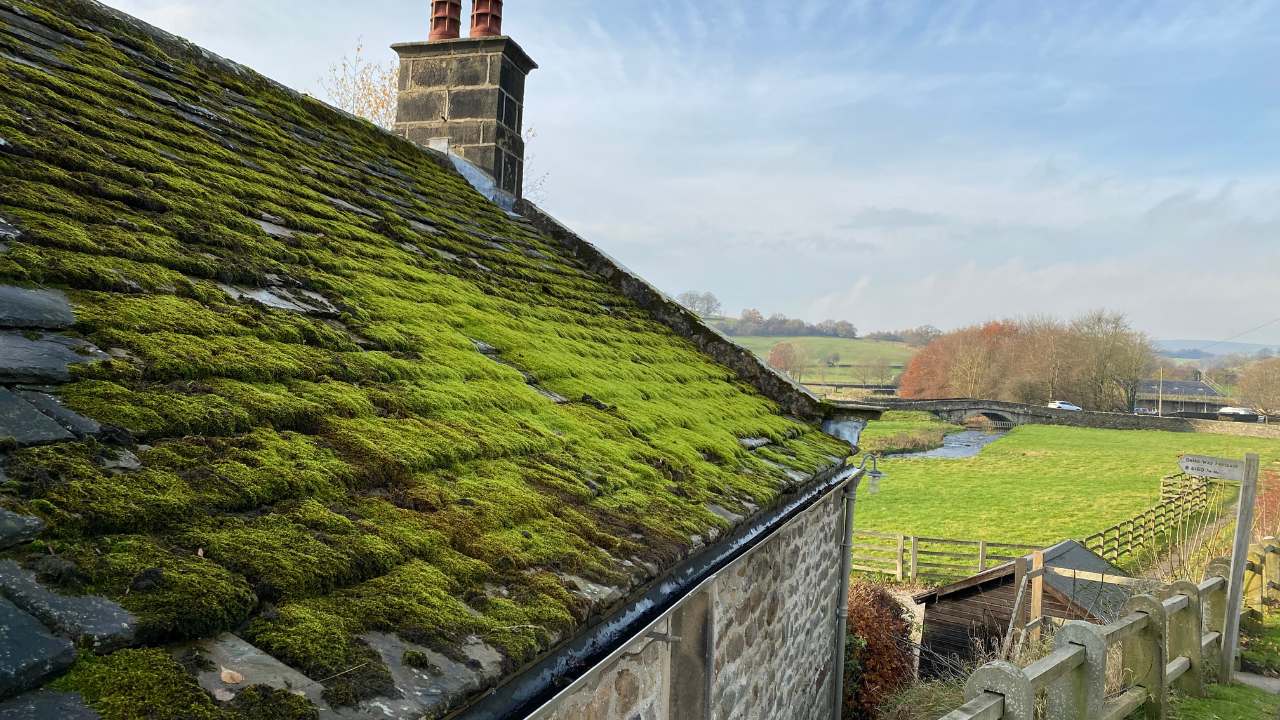Is Roof Moss Harmful to My Home? – This is a common question among Irish people!
Moss on a roof can cause significant issues over time. While moss itself isn’t directly harmful, its growth on your roof can lead to moisture buildup, which may damage shingles and lead to leaks.
These leaks create an environment for mould to grow, which can pose health risks and require costly repairs. Regular maintenance can help prevent these problems and keep your roof in good condition.
In this blog, we will help you explain the things to consider before removing moss and how to prevent the moss from returning.
Let’s start!
Is Moss on Roof Really Bad for Your Home?
Moss on your roof might seem harmless or even add a rustic charm, but it can pose serious risks to your home if left unchecked.
This seemingly innocent green growth grows in damp, shaded areas, often trapping moisture against your roof’s surface.
Over time, this excess moisture can lead to issues such as weakened shingles, rot, and even structural damage.
Understanding the potential harm moss can cause is essential for homeowners who want to protect their property.
What Are the Things to Consider Before Removing Moss from Your Roof?
Here are the crucial factors to consider before removing moss from your roof:
Assess the Roof’s Condition
Before tackling moss removal, evaluate the overall condition of your roof.
Check for any signs of damage, loose shingles, or weak spots that could worsen during the cleaning process. This will help you determine if professional assistance is needed.
Choose the Right Cleaning Method
Moss removal methods vary, from soft washing to pressure washing. Each has its pros and cons, with certain methods being gentler on roof surfaces.
Select a method that’s effective yet safe for your roof’s material to prevent unnecessary wear.
Consider Environmental Impact
Some moss removal solutions contain chemicals that can be harmful to plants and surrounding areas.
Opt for eco-friendly products when possible to protect your home and reduce any environmental risks.
Know the Risks of DIY Removal
Removing moss from your roof can be risky, especially on steep or high surfaces.
DIY methods may save costs but could pose safety hazards. Weigh the risks and consider hiring professionals if needed.
How to Prevent Moss from Growing on Your Roof?
Following are the ways to prevent moss growth on your roof:
Trim Overhanging Tree Branches
Shade and moisture create ideal conditions for moss growth.
Trimming nearby trees can reduce shaded areas on your roof, allowing more sunlight to reach the surface and helping to keep it dry.
Install Zinc or Copper Strips
Zinc and copper strips can prevent moss growth by releasing natural compounds that promote moss development.
Install these at the roof’s peak for long-lasting protection and minimal maintenance.
Regularly Clean Your Gutters
Clogged gutters trap moisture, which can encourage moss growth along roof edges.
Keep your gutters clean and debris-free to ensure proper water drainage and reduce moss buildup.
Schedule Routine Roof Inspections
Routine roof inspections help spot early signs of moss growth before it spread.
Schedule periodic checks to catch moss or other potential issues, ensuring your roof stays in top condition.
Conclusion
While moss may seem harmless, it can lead to severe issues like roof damage, leaks, and mould growth if left unchecked. Regular maintenance and timely moss removal are essential to protect your roof and maintain a safe, healthy home.
If you notice moss beginning to take hold, it’s wise to address it sooner rather than later. Contact VentSolve today for professional moss removal and roof care services.
Our experts can help you protect your roof and ensure your home remains protected against moss damage.
FAQs
Why is moss growing on my roof?
Moss typically grows on roofs that are shaded, damp, or retain moisture. Overhanging trees and lack of sunlight create ideal conditions for moss to grow.
Can roof moss damage my home?
Yes, moss can trap moisture against the roof surface, which can weaken shingles, cause leaks, and promote mould growth, potentially leading to structural damage over time.
Is roof moss removal necessary?
Removing roof moss is essential to prevent damage. Left unchecked, moss can degrade roofing materials, leading to costly repairs and a shorter roof lifespan.
Does moss on the roof lead to leaks?
Moss holds moisture against the roof, which can seep into small gaps and cause leaks. Over time, these leaks may damage your home’s interior and insulation.
Can I remove moss from my roof myself?
While some homeowners attempt DIY moss removal, professional cleaning is safer and more effective, especially for high roofs or extensive moss coverage.
How can I prevent moss from growing on my roof?
Regular maintenance, trimming overhanging branches, and installing zinc or copper strips can help prevent moss growth by reducing shade and moisture.


